CNA’s Life Under Siege spotlights Ukrainians caught in war
The CNA documentary debuting on May 4 follows the everyday lives of three Ukrainians caught up in Russia's attack on their country.
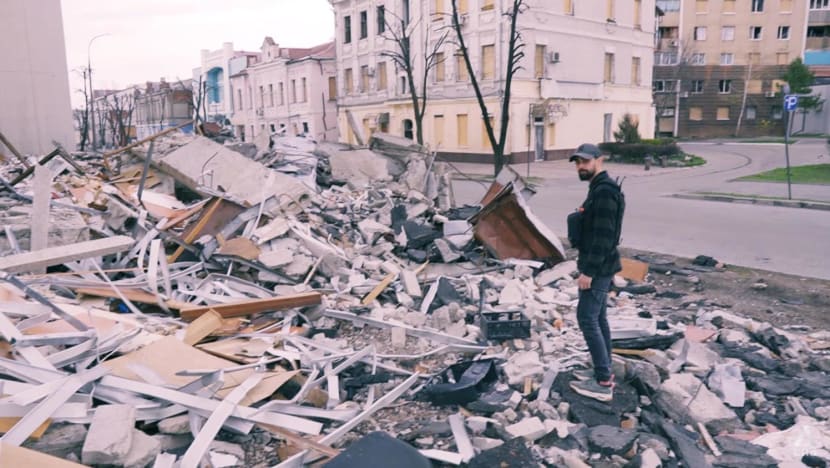
A man standing in what used to be part of a building in Kharkiv, Ukraine.
It has been over two months since Russia invaded Ukraine on Feb 24, forcing more than 5.2 million Ukrainians to flee their country. But what is it like for those who chose to stay? CNA documentary Life Under Siege - debuting May 4 at 9pm SG/HK - features three Ukrainians who stepped into critical roles even as their lives have been upended overnight.
FROM CEO TO VOLUNTEER AID WORKER
Close to the edge of Ukraine, CEO Oleksandr Udaly takes on a mission to transport humanitarian aid like food and medical supplies into the city of Kharkiv, close to the Russian border.
In the documentary, Udaly joins a group of volunteers who are trying to stock up in Kharkiv ahead of an expected second wave of attacks from the Russian army. “Our mission… is to deliver as many supplies as we can until the real fight starts,” said Udaly.
Kharkiv is a border city that lies between Russia and Ukraine. It is also a key battleground critical to Russia’s advance beyond the east.
Udaly reveals in the documentary that he had gone on a business trip to Kharkiv a month prior to the invasion. “There were millions of people there. There was huge activity in the city.” He now describes the city as “like from zombie movies”.
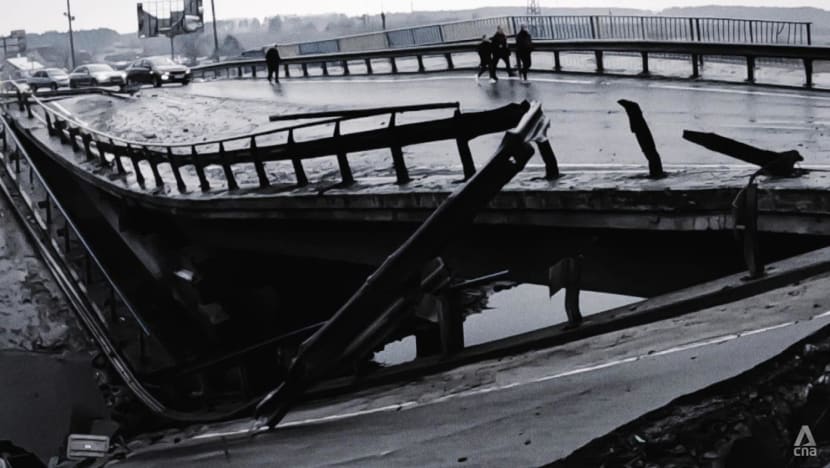
Before the war, Udaly was working in the esports industry. “We were organising events, we were organising tournaments. We were opening and managing esports arenas all over the country. It was all about pure fun and entertainment.”
After the invasion, he stopped all company activities and swapped his car for a cargo van to better transport humanitarian supplies.
Udaly and his wife chose to remain in their country with their children despite the chaos. But the couple got into an argument when Udaly revealed his decision to volunteer. “She wanted me to be with them … I don’t think that I could forgive myself if I just sit and watch all the events coming.”
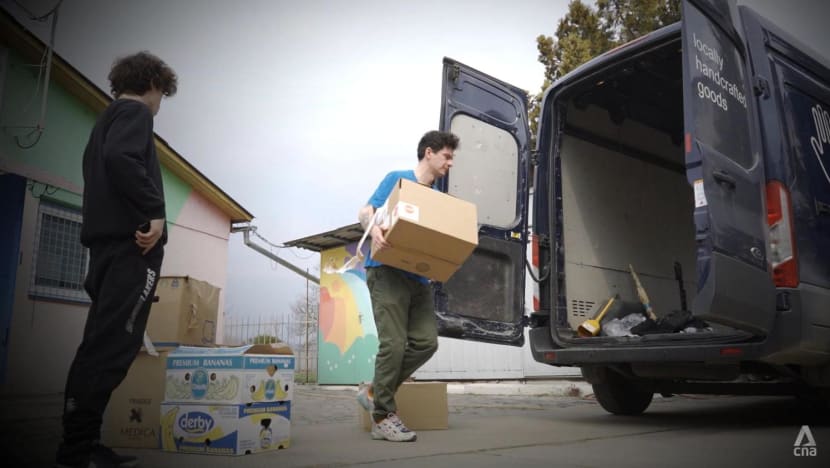
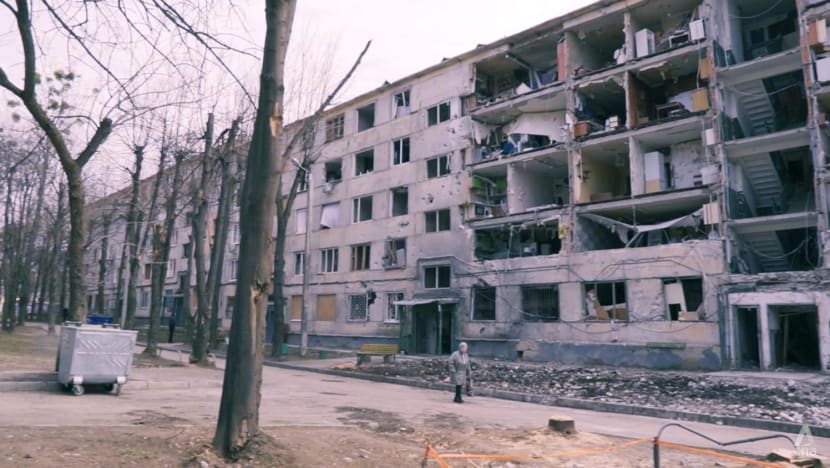
A KYIV RESIDENT’S DAILY ROUTINE
Over in Ukraine’s capital Kyiv, Vladyslav Pavlenko tells CNA about his wartime routine. “My day starts at about four in the morning. Every day we take turns in our security room and watch for unwanted visitors.”
The Kyiv resident keeps guns, including an AK47, close to his side. “I have never used guns before. But if necessary I will not hesitate to do so,” said Pavlenko, as he shows the weapons on camera.
He and his wife sleep in the basement of a billiard club with five other families. “We could hear the sirens in the basement. The first, three or four weeks, we heard them about six, seven, eight times per night.”
Restaurants, cafes and bakeries in Kyiv have been preparing about 10,000 meals every day for the army, hospitals, orphanages and elderly since the war started. Pavlenko helps out in the day at a kitchen that cooks 250 meals daily for the military and police.
In his spare time, he helps his friends who are fighting in the war get hold of equipment.
“When we first arrived, the situation was horrible,” said Oleksandr Shostak, Pavlenko’s friend from the Ukrainian Territorial Defence Force. “We had problems with night fights because we could not see (the Russian forces). We need some drones to perform scouting and thermal scopes to see the enemy in the dark,” said Shostak. Pavlenko goes online to look for such equipment and arranges to have them shipped from the US and Europe to Ukraine.
Together with his wife, Pavlenko returns to his home twice a day to feed his two cats and dog. “Many times when we were travelling back home to feed our pets, we heard the siren many times. So we rush back into our basement, or hiding place, or back home, just to be on the safe side.”
Pavlenko says he was close to tears when he saw the damage of his city from the war. “I can remember all the spaces while they were in good shape. It’s a heart-squeezing thing.”
“IT’S HATE THAT KEEPS ME GOING”
At a humanitarian centre in Przemysl, Poland, Stefanija Gutkovska helps Ukrainians who are fleeing their country. When Russia invaded Ukraine, the photographer and videographer was in Oslo. “I was trying to help from there as much as I could … But after a week, I realised that I wasn’t feeling good by staying far away. I felt like I really needed to do something on the spot and help people, and see that I’m helping them.”
The humanitarian centre is set in a shopping mall. “So it’s basically an empty supermarket, where we try to accommodate people and give them a place to stay for at least one or two nights,” said Gutkovska.
According to Gutkovska, a constant flow of people arrives at Przemysl from the border between Poland and Ukraine. “So we have people arriving anytime, day and night, from 2am in the morning to 11pm in the evening.”
While helping others, Gutkovska worries about her family and friends in Ukraine. “If the war is not over soon, in a week or two, they might be sent to the frontlines to fight.”
She says the only thing she has left inside of her is anger. “I don’t want to be feeling all that hate towards Russia and Russian people. But I think that right now, it’s hate that actually keeps me going.”
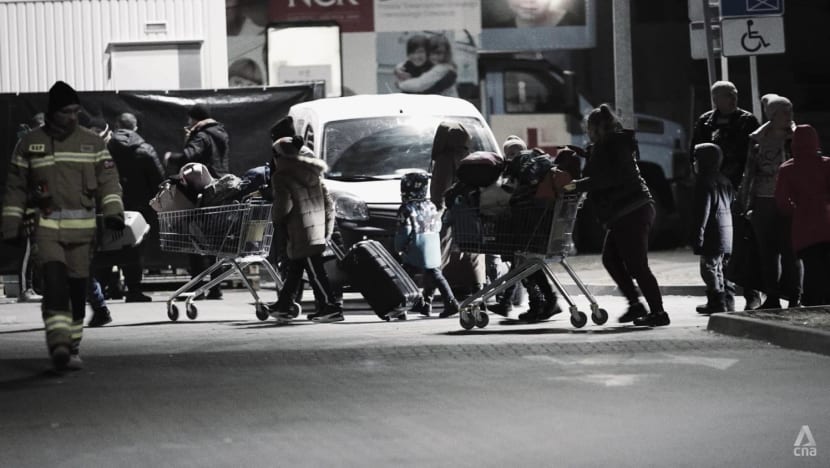
HOPE FOR THE FUTURE
As the Ukrainians strive to keep their day-to-day going, they carry a shared hope of rebuilding their country.
“Every person who goes through me… in the refugee centre, they all say one thing. I want to go somewhere where I can work, because we need to make money, because we want to go back home and we need to rebuild our country,” said Gutkovska.
Pavlenko shares the same views. “We want to rebuild all damaged and demolished cities, and towns and villages in Ukraine. And we want to live a happy and free life. We will win, I know that. Slava Ukrayini (glory to Ukraine)!”
Catch Udaly, Pavlenko and Grabowska in action in CNA’s new documentary, Life Under Siege here:













